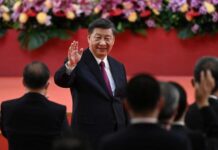
(TibetanReview.net, Jan03’19) – President Xi Jinping has made it clear Jan 2 that China must and will be reunified with the incorporation of what Beijing considers the breakaway province of Taiwan. Although Taiwan was not an issue of immediate interest and concern to Mao Zedong and Deng Xiaoping, China’s phenomenal economic growth and, with it, military power in recent decades changed all that. During Hu Jintao’s rule the country passed an Anti-Secession Law in 2005, providing for armed invasion should the de facto independent Taiwan move to declare itself a sovereign state.
“It is a historical conclusion drawn over the 70 years of the development of cross-Strait relations, and a must for the great rejuvenation of the Chinese nation in the new era,” China’s official Xinhua news agency Jan 2 quoted Xi as saying.
Xi, who wears China’s top three hats as the general secretary of the Communist Party of China Central Committee, chairman of the Central Military Commission, and state President, was reported to have made the remarks at a gathering to commemorate the 40th anniversary of issuing Message to Compatriots in Taiwan. The message is seen as the start of improvement in ties between the two sides.
He has called on Chinese people across the Taiwan Strait as well as at home and abroad to work together to jointly advance the process toward the peaceful reunification of China.
However, he also warned that China reserved the right to use force, noted bbc.com Jan 2.
He has called both sides part of the same Chinese family and that Taiwanese independence was “an adverse current from history and a dead end”.
He has also stressed that relations with Taiwan were “part of China’s domestic politics” and that “foreign interference is intolerable”, apparently referring to Taipei’s special ties with the USA.
The day before Xi’s speech, Taiwan’s president Tsai Ing-wen said Beijing should accept the existence of Taiwan and use peaceful means to resolve its differences.
“I would like to call on China to face squarely the reality of the existence of the Republic of China on Taiwan,” Ms Tsai was quoted as saying, referring to the island’s formal name which implies its government’s jurisdiction over the mainland as well.
China should “respect the insistence of 23 million people on freedom and democracy, and must use peaceful, on parity means to handle our differences”, she has added.
While Ms Tsai’s Democratic Progressive Party is seen as being pro-independence, the main opposition party, the nationalist Kuomintang (KMT) had ruled the mainland before being ousted in 1949 by the communist revolution. The KMT favours reunification only with a democratic China that respects human rights and rule of law.
Xi has called on Beijing and Taipei to start talks on unification and adoption of “one country, two systems” in Taiwan, laying out steps to “settle” the 70-year-old divisions between the two sides, reported the scmp.com Jan 2.
The political division across the strait … cannot be passed on from generation to generation,” it quoted him as saying.
“The problem of Taiwan existed because the Chinese nation was weak and in chaos, but it will end along with national rejuvenation,” Xi was further quoted as saying.
On the use of force, the report cited him as stressed that the military would only target external elements and those seeking independence for Taiwan, adding, Chinese people will not fight Chinese people.”





